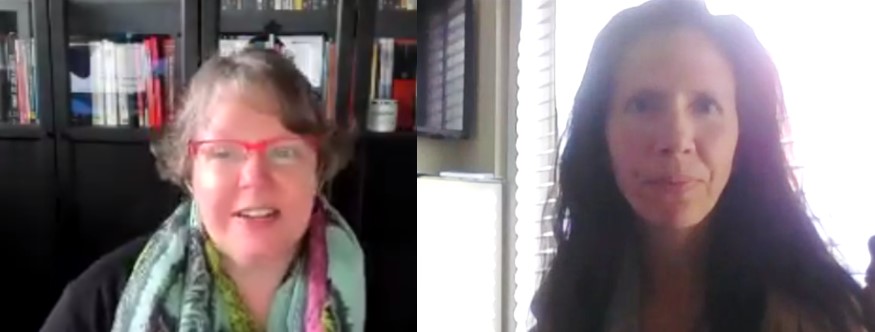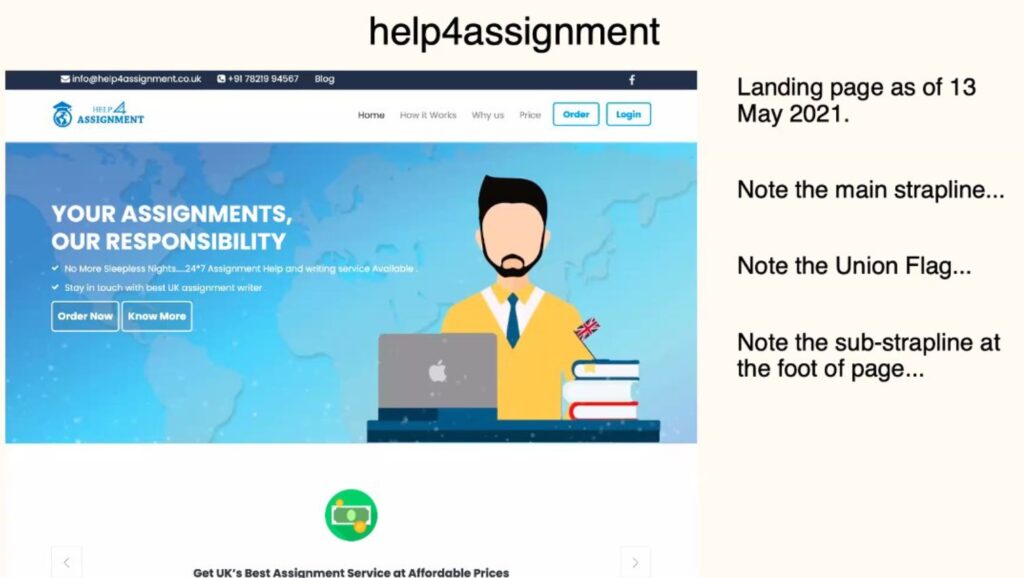The European Conference on Academic Integrity and Plagiarism (ECAIP) is the conference formally known as Plagiarism Across Europe and Beyond. The 2021 version of the conference took place virtually. The timing, unfortunately, clashed with my having many university commitments, so I was only able to attend a small number of talks live. A lot of information about the conference is archived with the Twitter hashtag #ECAIP2021.
I was fortunate enough to be able to deliver two talks with student partners, both of which I have written about on the blog. Benjamin Dent and I looked at contract cheating on Freelancer.com. Rahul Gupta and I focused on contract cheating on Reddit. I also hosted a paper session, chaired a panel on contract cheating where we discovered that many countries are still not fully engaging with this problem and presented at a workshop aimed at helping others to publish in the academic integrity field.
It was very pleasing to see so many students involved in this conference, not only presenting and sharing research results, but also talking about innovations in their institutions and participating on panels.
My five conference reflections this time will be shorter than many, but I also encourage you to look at the three days of summaries from Debora Weber-Wulff, the first of which is linked here. These include many presentations I couldn’t get to, although with four presentations running in parallel through much of the conference, there is a lot for everyone to catch up on through the video recordings as time permits.
Reflection #1 – We Need To Ensure That All Students Understand Academic Integrity And Are Treated Equally
I’d like to start by highlighting the work of Mary Davis from Oxford Brookes University. Mary is also a member of the London and SE England Academic Integrity Network, which launched earlier this year.

At her own institution, Mary found that Indian, Pakistani, Black African students were disproportionally referred for academic integrity investigations, along with students with specific learning differences and those from widening participation backgrounds. There is an important question to ask about whether the correct support is in place for those students.
Mary also highlighted how stressful and difficult the process was for those students, including the example of one mature student who thought her student would view her as a criminal for being referred. More needs to be done to make sure that all students are supported to avoid academic misconduct in the first place and that any academic integrity investigations are conducted with dignity and avoid the prejudgement of guilt.
The issue of students not always understanding academic integrity, or only looking at this from a partial viewpoint, remains a problematic one. This issue is amplified when issues of inclusivity are considered. Here is a tweet from Mike Reddy which sums up the situation.
Like drivers with speed cameras, students often see the only problem is “What happens when I am caught?” rather than all the times where the car driver speeds and isn’t detected; dangerous driving, pollution, etc
#ECAIP2021— Dr Mike Reddy PFHEA (@DoctorMikeReddy) June 11, 2021
Reflection #2 – We Need To Make Technology Work For Us
So often, academic integrity is looked at as an issue of technology. The idea is that, with the right software, we can solve the problem. As I’ve said many times, technology is a tool, it can be useful, but technology is only one part of a wider solution.
The issue of proctoring software was hotly debated, including in a presentation by Phillip Dawson where he gave 10 suggestions for improving practice.

The word “blockchain” appeared so many times during the conference, to the extent I even joked about it (although I’m not sure everyone realised I wasn’t being serious). The problem is that blockchain (or decentralisation) is a trend, it’s discussed a lot, but it’s not clear what problem it is a solution for. Even if it was a solution, quite frankly many people just don’t understand the technology. Explaining how the technology used to support academic integrity works is going to become very important.
Reflection #3 – The Effects Of Covid-19 On Academic Integrity Will Be Felt Over The Longer Term
Several people highlighted their own data, including studies in progress, which suggested an increase in student cheating during Covid-19. This was echoed in my own work with Rahul Gupta. Some people had numbers from their own institutions, with Ann Rogerson noting a big increase in collusion at the University of Wollongong.

Ann Rogerson talked about how students are now sharing answers during exams taken remotely through channels that couldn’t easily be tracked and archived, including using Snapchat messages that delete after a few seconds and by routing communication through the messaging systems inside popular online games.
A concerning development that Ann identified was the way that cheating networks evolved once lockdown was lifted and students were able to get together in person. Ann found examples of students gathering together in the same location, able to collude and to talk together during remote unproctored exams. There was no need for the further apps and technology in that case. A conversation has to be asked in situations like this regarding how such situations can be avoided when (and if) in-person study resumes.
Reflection #4 – We Need To Do More To Address Degree Mills
The problem of students buying not only individual assignments, but also a whole qualification, is an underexplored one in the literature. Jamie J. Carmichael and Sarah Eaton have been working on this area
One finding Jamie and Sarah highlighted, based on analysing website text, was the over-appearance of the words “Chinese” and “Malaysia“, suggesting a market that diploma mills were aiming their services towards.
Jamie and Sarah found that you can buy not only the finished degree certificates, but also the accompanying transcripts. In some cases, providers claim to have access to computer systems to put fake grades into an official system. But in a link with the research we’ve seen into blackmail and contract cheating, if you don’t keep paying up and buying more and more qualifications, you run the risk of the company exposing your identity.

Reflection #5 – Students Are At Risk Of Continual Exploitation And We Need To Act
The dangers posed by the contract cheating industry have come up many times in my own research, not just because students can be getting qualifications that they don’t deserve, but also because students themselves are being cheated and taken advantage of.
Rahul and I highlighted several Reddit scams, including how students were being contacted by fake services after asking for help, who were out to extort students.
I unfortunately didn’t get to catch Felicity Prentice’s presentation on contract cheating, but I did see Zeenath Khan’s tweet, which highlighted students complaining about receiving poor quality or plagiarised work. Now, the hope is that students will never be in a situation where they do purchase answers, but this happens and we have to think about how we support them when they are taken advantage of by essay mills and contract cheating providers.
Wow some amazing Pecha Kucha videos being presented at #ECAIP2021! Loving #Felicity look at how students provide “rating and feedback” to “bad services” of essay mills! pic.twitter.com/kM7P7FUxkV
— Zeenath Reza Khan (@ZeenathRK) June 11, 2021
Robin Crockett shared how contract cheating providers were sharing the details of their customers to other prospects, often in the form of so-called testimonials. These customers are then identifiable. When student partners share such testimonials with staff at their university, these purchases are no longer risk free.
Robin also discussed how misleading the whole contract cheating industry. Here is just one example from his talk, an essay mill claiming to be based in the UK, but which is actually operating out of India (the same country which my own research with Benjamin Dent was found generating most of the requests for work on Freelancer.com).

To close, the issue of legislation came up several times at the conference. I was asked about in my own presentation. But the issue of where contract cheating providers (and their workers) are actually based does mean that, although we should certainly be pursuing the legal options, enforcement may end up being rather difficult.
As always, we have to continue addressing contract cheating through as wide a range of methods as possible.
